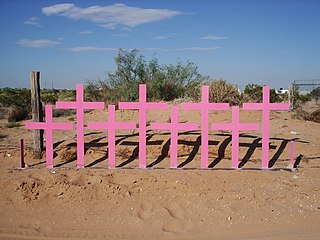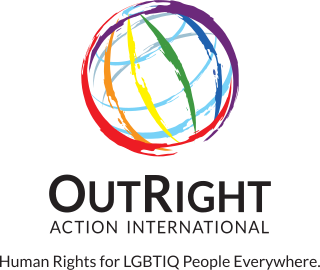
More than 500 women were killed between 1993 and 2011 in Ciudad Juárez, a city in northern Mexico. The murders of women and girls received international attention primarily due to perceived government inaction in preventing the violence and bringing perpetrators to justice. The crimes have featured in many dramas, songs, and books.

Femicide or feminicide is a term for the killing of females, often because of their gender. In 1976, the feminist author Diana E. H. Russell first implicitly defined the term as a hate killing of females by males but then went on to redefine it as "the killing of females by males because they are female" in later years. Femicide can be perpetrated by either sex but is more often committed by men. This is most likely due to unequal power between men and women as well as harmful gender roles, stereotypes, or social norms.

Charlotte Anne Bunch is an American feminist author and organizer in women's rights and human rights movements. Bunch is currently the founding director and senior scholar at the Center for Women's Global Leadership at Rutgers University in New Brunswick, New Jersey. She is also a distinguished professor in the Department of Women's and Gender Studies at Rutgers.
Sunila Abeysekera was a Sri Lankan human rights campaigner. She worked on women's rights in Sri Lanka and in the South Asia region for decades as an activist and scholar. Quitting a career as a singer, Abeysekera briefly joined the Janatha Vimukthi Peramuna and then founded the Women and Media Collective in 1984. As head of the INFORM Human Rights Documentation Centre, she monitored human rights violations by all parties in the civil war. She received the United Nations Human Rights Award in 1999 and the Didi Nirmala Deshpande South Asian Peace and Justice Award in 2013.

The United Nations General Assembly has designated November 25 as the International Day for the Elimination of Violence Against Women. The premise of the day is to raise awareness around the world that women are subjected to rape, domestic violence and other forms of violence; furthermore, one of the aims of the day is to highlight that the scale and true nature of the issue is often hidden. For 2014, the official theme framed by the UN Secretary-General’s campaign UNiTE to End Violence against Women, was Orange your Neighbourhood. For 2018, the official theme was "Orange the World:#HearMeToo", for 2019 it was "Orange the World: Generation Equality Stands Against Rape", for 2020 it was "Orange the World: Fund, Respond, Prevent, Collect!", for 2021 it was "Orange the World: End Violence against Women Now!", for 2022 the theme was "UNiTE! Activism to end violence against women and girls" and for 2023 it is "UNiTE! Invest to Prevent Violence Against Women & Girls! #No Excuse".

The Fourth World Conference on Women: Action for Equality, Development and Peace was the name given for a conference convened by the United Nations during 4–15 September 1995 in Beijing, China.
Equality Now is a non-governmental organization founded in 1992 to advocate for the protection and promotion of the human rights of women and girls. Equality Now works through public policy channels to create a just world for women and girls. Through a combination of regional partnerships, community mobilization and legal advocacy the organization works to encourage governments to adopt, improve and enforce laws that protect and promote women and girls' rights around the world.
Human Rights in Mexico refers to moral principles or norms that describe certain standards of human behaviour in Mexico, and are regularly protected as legal rights in municipal and international law. The problems include torture, extrajudicial killings and summary executions, police repression, sexual murder, and, more recently, news reporter assassinations.

OutRight International (OutRight) is an LGBTIQ human rights non-governmental organization that addresses human rights violations and abuses against lesbian, gay, bisexual, transgender and intersex people. OutRight International documents human rights discrimination and abuses based on their sexual orientation, gender identity, gender expression and sex characteristics in partnership with activists, advocates, media, NGOs and allies on a local, regional, national and international level. OutRight International holds consultative status with ECOSOC.

The Center for Women's Global Leadership, based at Rutgers University, was founded in 1989 by Charlotte Bunch, the former executive director and an internationally renowned activist for women's human rights. Executive Director Krishanti Dharmaraj is also the founder of the Dignity Index and co-founder of WILD for Human Rights and the Sri Lanka Children's Fund. The former executive director, Radhika Balakrishnan, is now the faculty director, and a professor in the Department of Women's and Gender Studies at Rutgers, chair of the Board of the US Human Rights Network, and a board member of the Center for Constitutional Rights. Located on Douglass Residential College at Rutgers University, CWGL is a unit of International Programs within the School of Arts and Sciences and is a member of the Institute for Women's Leadership, a consortium of women's programs at Rutgers.

Discussions of LGBTQI+ rights at the United Nations have included resolutions and joint statements in the United Nations General Assembly and the United Nations Human Rights Council (UNHRC), attention to the expert-led human rights mechanisms, as well as by the UN Agencies.
The Declaration on the Elimination of Violence Against Women was adopted without a vote by the United Nations General Assembly in the 48/104 resolution of 20 December 1993. Contained within it is the recognition of "the urgent need for the universal application to women of the rights and principles with regard to equality, security, liberty, integrity and dignity of all human beings". It recalls and embodies the same rights and principles as those enshrined in such instruments as the Universal Declaration of Human Rights, and Articles 1 and 2 provide the most widely used definition of violence against women.
The United Nations Entity for Gender Equality and the Empowerment of Women, also known as UN Women, is a United Nations entity charged with working for gender equality and the empowerment of women. UN Women is charged with advocating for the rights of women and girls, and focusing on a number of issues, including violence against women and violence against LGBT people.

Violence against women in Guatemala reached severe levels during the long-running Guatemalan Civil War (1960-1996), and the continuing impact of that conflict has contributed to the present high levels of violence against women in that nation. During the armed conflict, rape was used as a weapon of war.
Sister Namibia, formerly known as the Sister Namibia Collective, is a feminist nonpartisan non-governmental organization (NGO) located in Windhoek, Namibia. The organization was established in 1989 on the eve of Namibia's independence from South Africa. Sister Namibia advocates for women's rights and engages in activities that promote full gender equality in a world free from violence, discrimination, and oppression. From its inception, the organization's main function has been to produce Sister Namibia Magazine. In the 1990s Sister Namibia expanded its operations to include educational programs, research, activism, media engagement, and cultural activities in support of women's rights.

Lepa Mladjenovic is a feminist, lesbian, anti-war activist who is a pioneer of second-wave feminism in Serbia. She is a feminist counselor for women survivors of male violence or lesbophobia, a workshop facilitator, a writer and lecturer and a member of several international boards and networks which are concerned about lesbian rights and violence against women. Mladjenovic is considered a symbol of women's activism in the former Yugoslavia. Born in Belgrade, she spent her childhood summer holidays in Sarajevo and at the Adriatic Sea. As of 2017, Mladjenovic lives in Belgrade.
Women in Law & Development in Africa (WiLDAF) is a Pan-African women's rights organization and network which is non-profit and non-government (NGO) and contains 500 organizations, 1200 individuals and spreads over 27 countries. Even though WiLDAF functions as a multi-regional/transnational organization, it pays close attention to the economical, social and historical differences between states and countries.
Randa George Yacoub Siniora is a Palestinian human rights and women's rights activist. She has documented human rights violations in the occupied Palestinian territories for three decades, and is currently general director of the Women’s Center for Legal Aid and Counseling (WCLAC) in Jerusalem.

The Inter-American Convention on the Prevention, Punishment, and Eradication of Violence against Women, better known as the Belém do Pará Convention, is an international human rights instrument adopted by the Inter-American Commission of Women (CIM) of the Organization of American States (OAS) at a conference held in Belém do Pará, Brazil, on 9 June 1994. It is the first legally binding international treaty that criminalises all forms of violence against women, especially sexual violence. On 26 October 2004, the Follow-Up Mechanism (MESECVI) agency was established to ensure the State parties' compliance with the Convention.
The Women's Center for Legal Aid and Counseling (WCLAC) is an independent Palestinian, non-profit, non-governmental organization active in East Jerusalem and throughout the West Bank. Founded in 1991 by Maha Abu Dayyeh, WCLAC holds special consultative status with the United Nations Economic and Social Council (ECOSOC).












